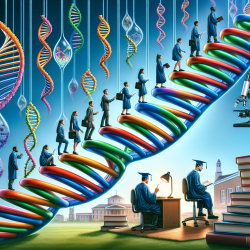The journey of education is a complex interplay of various factors, including the environment, personal interests, and innate abilities. Recent research has shed light on the significant role genetics plays in educational success, particularly at the university level. This understanding opens new avenues for educators and practitioners to enhance their skills and support students more effectively.
The Role of Genetics in University Success
A groundbreaking study titled "The Genetics of University Success" delves into the genetic factors influencing university outcomes. This research utilized a sample of 3,000 genotyped individuals and 3,000 twin pairs to explore the heritability of university success metrics such as entrance exam achievement, enrollment decisions, and university quality.
The findings revealed substantial genetic influences on these outcomes:
- University Entrance Exam Achievement: 57% heritability
- University Enrollment: 51% heritability
- University Quality: 57% heritability
- University Achievement: 46% heritability
This suggests that genetic factors significantly contribute to students' decisions and performance in higher education.
Implications for Educators and Practitioners
Understanding these genetic influences provides educators with valuable insights into tailoring educational experiences. Here are some ways practitioners can apply these findings:
- Personalized Learning Paths: Recognize that students may have innate predispositions towards certain subjects or fields. Encourage exploration in areas where they naturally excel.
- Supportive Environments: While genetics play a role, environmental factors are crucial. Create supportive learning environments that nurture students' strengths and address individual challenges.
- Data-Driven Decisions: Utilize data from genetic studies to inform educational policies and practices. This can help identify areas where interventions may be most effective.
- Encouraging Further Research: Engage in or support further research into the genetic basis of education to continuously improve teaching methodologies.
The Future of Education: A Genetic Perspective
The concept of gene-environment correlation highlights how individuals select environments that align with their genetic propensities. For instance, a student with a natural aptitude for mathematics might gravitate towards math-intensive courses or extracurricular activities. Recognizing this can help educators guide students towards fulfilling educational paths.
The study also emphasizes the potential for DNA-based predictions in real-world outcomes. As the predictive power of genome-wide polygenic scores increases, educators could use these insights to better understand students' educational trajectories and provide more personalized guidance.
Conclusion: A Call to Action for Educators
The intersection of genetics and education offers exciting possibilities for enhancing student success. By embracing these insights, educators can refine their approaches to teaching and create more inclusive and effective learning environments.
To read the original research paper, please follow this link: The genetics of university success.










